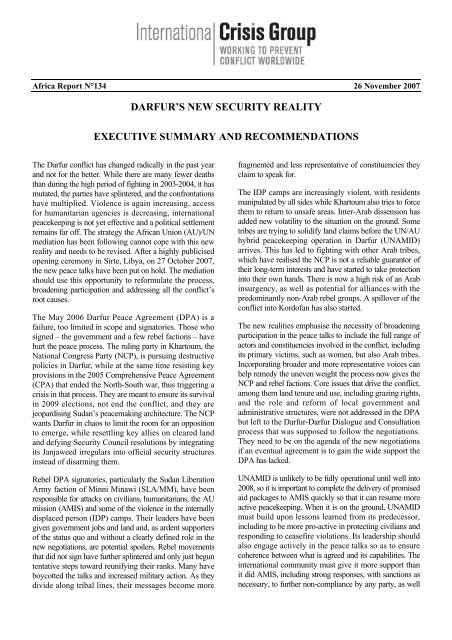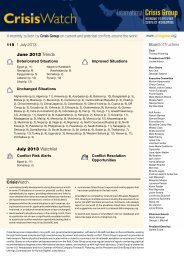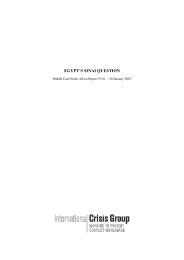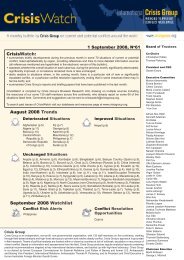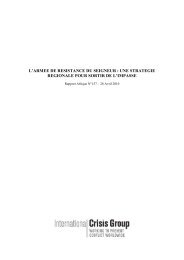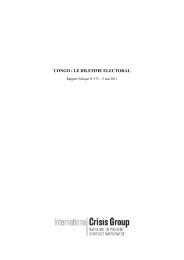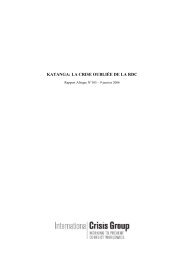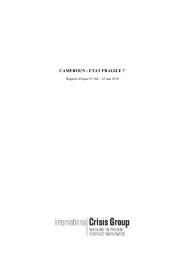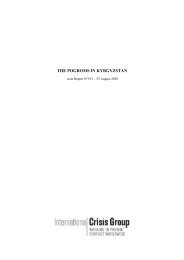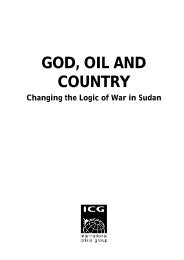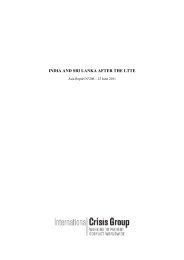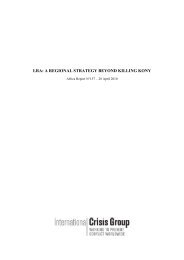sudan - International Crisis Group
sudan - International Crisis Group
sudan - International Crisis Group
You also want an ePaper? Increase the reach of your titles
YUMPU automatically turns print PDFs into web optimized ePapers that Google loves.
S<br />
Africa Report N°134 26 November 2007<br />
DARFUR’S NEW SECURITY REALITY<br />
EXECUTIVE SUMMARY AND RECOMMENDATIONS<br />
The Darfur conflict has changed radically in the past year<br />
and not for the better. While there are many fewer deaths<br />
than during the high period of fighting in 2003-2004, it has<br />
mutated, the parties have splintered, and the confrontations<br />
have multiplied. Violence is again increasing, access<br />
for humanitarian agencies is decreasing, international<br />
peacekeeping is not yet effective and a political settlement<br />
remains far off. The strategy the African Union (AU)/UN<br />
mediation has been following cannot cope with this new<br />
reality and needs to be revised. After a highly publicised<br />
opening ceremony in Sirte, Libya, on 27 October 2007,<br />
the new peace talks have been put on hold. The mediation<br />
should use this opportunity to reformulate the process,<br />
broadening participation and addressing all the conflict’s<br />
root causes.<br />
The May 2006 Darfur Peace Agreement (DPA) is a<br />
failure, too limited in scope and signatories. Those who<br />
signed – the government and a few rebel factions – have<br />
hurt the peace process. The ruling party in Khartoum, the<br />
National Congress Party (NCP), is pursuing destructive<br />
policies in Darfur, while at the same time resisting key<br />
provisions in the 2005 Comprehensive Peace Agreement<br />
(CPA) that ended the North-South war, thus triggering a<br />
crisis in that process. They are meant to ensure its survival<br />
in 2009 elections, not end the conflict, and they are<br />
jeopardising Sudan’s peacemaking architecture. The NCP<br />
wants Darfur in chaos to limit the room for an opposition<br />
to emerge, while resettling key allies on cleared land<br />
and defying Security Council resolutions by integrating<br />
its Janjaweed irregulars into official security structures<br />
instead of disarming them.<br />
Rebel DPA signatories, particularly the Sudan Liberation<br />
Army faction of Minni Minawi (SLA/MM), have been<br />
responsible for attacks on civilians, humanitarians, the AU<br />
mission (AMIS) and some of the violence in the internally<br />
displaced person (IDP) camps. Their leaders have been<br />
given government jobs and land and, as ardent supporters<br />
of the status quo and without a clearly defined role in the<br />
new negotiations, are potential spoilers. Rebel movements<br />
that did not sign have further splintered and only just begun<br />
tentative steps toward reunifying their ranks. Many have<br />
boycotted the talks and increased military action. As they<br />
divide along tribal lines, their messages become more<br />
fragmented and less representative of constituencies they<br />
claim to speak for.<br />
The IDP camps are increasingly violent, with residents<br />
manipulated by all sides while Khartoum also tries to force<br />
them to return to unsafe areas. Inter-Arab dissension has<br />
added new volatility to the situation on the ground. Some<br />
tribes are trying to solidify land claims before the UN/AU<br />
hybrid peacekeeping operation in Darfur (UNAMID)<br />
arrives. This has led to fighting with other Arab tribes,<br />
which have realised the NCP is not a reliable guarantor of<br />
their long-term interests and have started to take protection<br />
into their own hands. There is now a high risk of an Arab<br />
insurgency, as well as potential for alliances with the<br />
predominantly non-Arab rebel groups. A spillover of the<br />
conflict into Kordofan has also started.<br />
The new realities emphasise the necessity of broadening<br />
participation in the peace talks to include the full range of<br />
actors and constituencies involved in the conflict, including<br />
its primary victims, such as women, but also Arab tribes.<br />
Incorporating broader and more representative voices can<br />
help remedy the uneven weight the process now gives the<br />
NCP and rebel factions. Core issues that drive the conflict,<br />
among them land tenure and use, including grazing rights,<br />
and the role and reform of local government and<br />
administrative structures, were not addressed in the DPA<br />
but left to the Darfur-Darfur Dialogue and Consultation<br />
process that was supposed to follow the negotiations.<br />
They need to be on the agenda of the new negotiations<br />
if an eventual agreement is to gain the wide support the<br />
DPA has lacked.<br />
UNAMID is unlikely to be fully operational until well into<br />
2008, so it is important to complete the delivery of promised<br />
aid packages to AMIS quickly so that it can resume more<br />
active peacekeeping. When it is on the ground, UNAMID<br />
must build upon lessons learned from its predecessor,<br />
including to be more pro-active in protecting civilians and<br />
responding to ceasefire violations. Its leadership should<br />
also engage actively in the peace talks so as to ensure<br />
coherence between what is agreed and its capabilities. The<br />
international community must give it more support than<br />
it did AMIS, including strong responses, with sanctions as<br />
necessary, to further non-compliance by any party, as well


